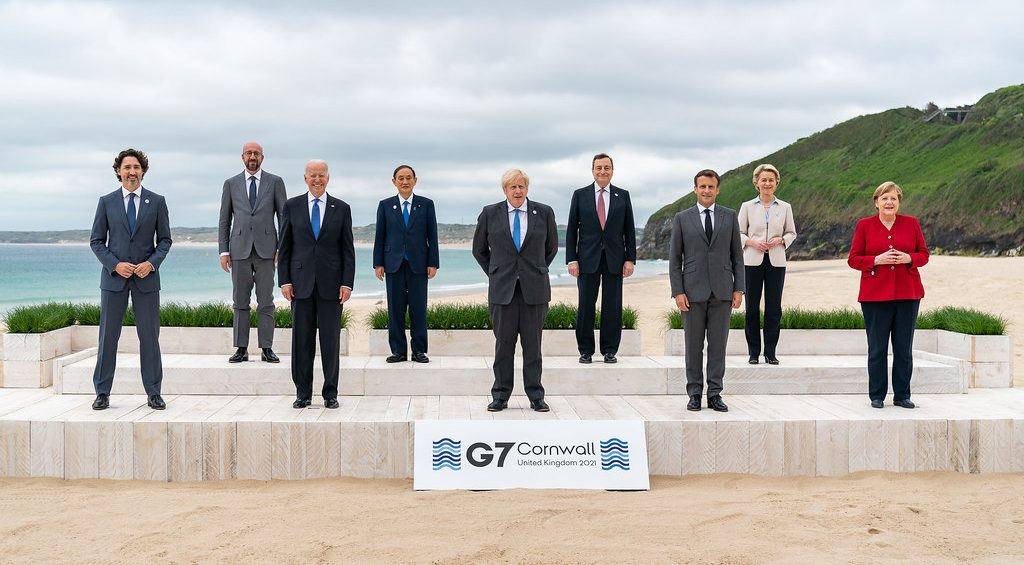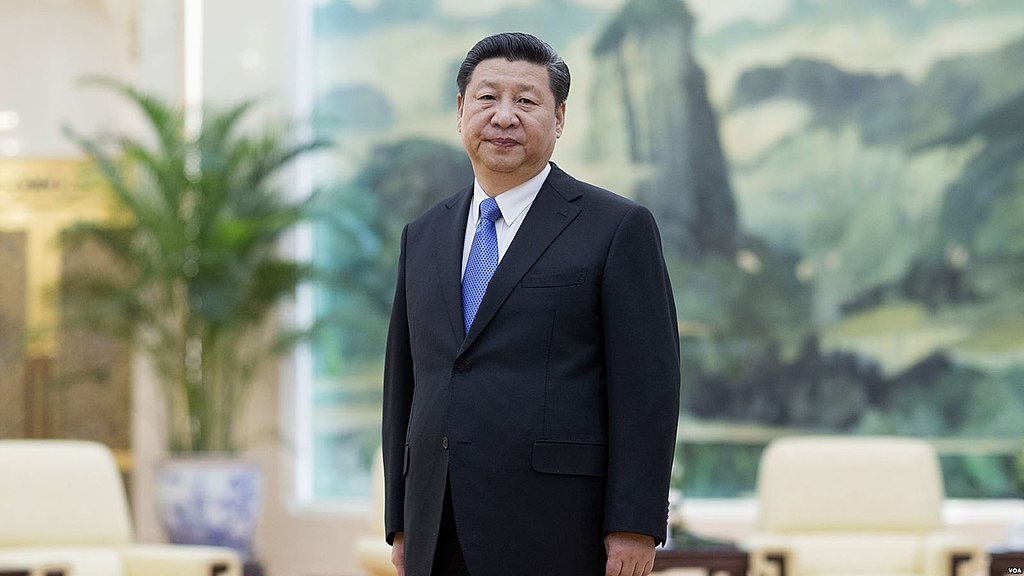
ICAS Bulletin (online ISSN 2836-3418, print ISSN 2836-340X) is published every other week throughout the year at 1919 M St NW, Suite 310, Washington, DC 20036.
The online version of ICAS Bulletin can be found at chinaus-icas.org/bulletins/.

– On November 15, U.S. President Joe Biden spoke virtually with Chinese President Xi Jinping. The pair stuck to their entrenched positions on contentious issues like Taiwan and human rights, but both leaders accepted a responsibility to manage the U.S.-China relationship to ensure that it does not lead to conflict.
– On November 12, Secretary of State Antony Blinken spoke on the phone with Chinese Foreign Minister Wang Yi where he reportedly asked his counterpart “to engage in meaningful dialogue” to resolve cross-straits relations in a way that is “consistent with the wishes and best interests of the people on Taiwan.”
– On November 10, near the end of the COP26 climate summit, the U.S. and China issued a joint declaration to cooperate on reducing greenhouse gas emissions.
– On November 9, President Xi released a letter to the National Committee on U.S.-China Relations stating that China “stands ready to work with the United States to enhance exchanges and cooperation across the board.”
– On November 8, National Security Advisor Jake Sullivan said in a CNN interview that the goal of the U.S.’ China policy is “not containment, it’s not a new Cold War.”
Associated News References:
“Biden raises human rights, Xi warns of Taiwan ‘red line’ in three hour talk,” Reuters, November 16 [Paywall]
“Biden, Xi hold virtual summit amid rising U.S.-China tensions,” NBC News, November 16
“Taiwan in focus at Biden-Xi summit, as tariffs and supply chain issues take a back seat,” CNBC, November 15
“Blinken Expressed Taiwan Concerns to China’s Wang Yi in Call,” Bloomberg, November 13 [Paywall]
“China ready to help bring US relations back on right track, Xi Jinping says ahead of key Biden call,” South China Morning Post, November 10 [Paywall]
“U.S. and China issue joint pledge to slow climate change,” The Washington Post, November 10 [Paywall]
“Xi says China is ready to work with U.S. on condition of ‘mutual respect’,” CNBC, November 9
“US wants coexistence not cold war with China, Jake Sullivan says,” South China Morning Post, November 8 [Paywall]

– On November 15, China Telecom’s U.S. subsidiary formally asked a U.S. appeals court to block the Federal Communications Commission’s revocation of the parent company’s license to operate in the United States.
– On November 9, 97% of companies in an HSBC survey reported that they intend to keep investing in China despite U.S.-China trade tensions, citing China’s large and growing economy and well-developed supply-chains.
– On November 9, the White House announced the extension of a Trump-era executive order banning Americans from investing in firms linked to the Chinese military.
– On November 8, the U.S. announced that it is eyeing to invest in 10 infrastructure projects by next January, funded under the G7’s Build Back Better World Initiative (B3W), to counter China’s Belt and Road Initiative (BRI).
– On November 4, President Xi stated that China’s subsidies to private industrial firms and state-owned enterprises are on the table for negotiation with the U.S.
– On November 3, USTR Katherine Tai called for new measures to counter China’s circumvention of existing anti-dumping and anti-subsidy duties.
Associated News References:
“China Telecom U.S. unit asks court to block U.S. FCC action,” Reuters, November 15 [Paywall]
“Foreign Firms to Expand in China Despite Challenges, HSBC Says,” Bloomberg, November 9 [Paywall]
“U.S. extends ban on securities investments in companies linked to China military,” Reuters, November 9 [Paywall]
“U.S. eyes January rollout of first projects to counter China’s Belt and Road -official,” Reuters, November 8 [Paywall]
“China open to talks on subsidies behind US tensions, Xi says,”Al Jazeera, November 5
“US wants trade law to combat Chinese overseas steel investment, Tai says, days after European Union deal,” South China Morning Post, November 3 [Paywall]

– On November 5, a spy for the Chinese Ministry of State Security was convicted in a federal U.S. court for plotting to steal trade and technology secrets from several American aviation companies.
– On November 4, the United Nations passed a draft resolution sponsored by China calling for cooperation on international security. It has been interpreted as China’s response to the AUKUS alliance and reflects a desire to eschew escalatory military technology transfer deals in favor of peaceful multilateral cooperation.
– On November 3, the Pentagon released its annual Congressionally-mandated China Military Power report where it warned of China’s expanding nuclear arsenal and increasingly aggressive behavior towards Taiwan.
Associated News References:
“Chinese spy convicted of trying to steal U.S. aviation trade secrets,” Reuters, November 5 [Paywall]
“Aukus in sights as UN backs China on peaceful transfers of new security tech,” South China Morning Post, November 4 [Paywall]
“China is rapidly expanding its nuclear arsenal, Pentagon says in new report,” CNBC, November 3

– On November 9, the American Civil Liberties Union filed a complaint with the Department of Commerce seeking civil damages on behalf of Chinese-American hydrologist Sherry Chen who was cleared of false espionage charges in 2015.
– On November 9, the U.S. Holocaust Memorial Museum released a 56-page report which states that the museum is “gravely concerned” that the “Chinese government may be committing genocide against the Uyghurs.”
– On November 3, the Chinese Ministry of Education accused U.S. Customs and Border Protections of engaging in “harassment and interrogations” of Chinese students studying in STEM fields in the United States. The campaign has, in some cases, resulted in the confiscation of electronics and the deportation of Chinese students.
Associated News References:
“Exclusive: ACLU joins Chinese American scientist’s lawsuit against U.S.,” Axios, November 9
“Holocaust Museum report warns China ‘may be committing genocide’,” Axios, November 9
“Chinese students being ‘harassed and interrogated’ in US, education ministry says,” South China Morning Post, November 3 [Paywall]

– On November 13, the Chinese Transport Ministry reported that plans are underway to develop a new heavy icebreaker ship by 2025, intended to aid with logistics and rescues along China’s ‘Polar Silk Road’ trade route in the Arctic.
– On November 9, a U.S. space technology company captured satellite images of what appear to be rail-mounted, full-scale mockups of U.S. aircraft carriers built by the Chinese military in the Taklamakan Desert.
– On November 5, the US Navy fired two senior officers in connection to the nuclear-powered submarine which ran aground in the South China Sea last month, the news of which was met with anger from Beijing.
– On November 3, the Chinese military began a week of live-fire drills in the East China Sea in response to joint U.S.-Japanese drills the previous week.
Associated News References:
“China to develop new heavy icebreaker for ‘Polar Silk Road’,” South China Morning Post, November 13 [Paywall]
“Satellite images appear to show mock-up US warships in China desert,” BBC, November 9
“US Navy fires 2 officers for South China Sea submarine mishap that angered Beijing,” South China Morning Post, November 5 [Paywall]
“Chinese military holds live-fire drills in East China Sea amid Taiwan tension,” South China Morning Post, November 3 [Paywall]

“Exclusive: Hank Paulson urges D.C. and Beijing to tone down the rhetoric,” The New York Times, November 16 [Paywall]
“China, U.S. agree to ease restrictions on journalists – China Daily,” Reuters, November 16 [Paywall]
“Rubio Files Dozens of Amendments to Defense Authorization Bill,” Office of Marco Rubio, US Senator for Florida, November 15
“China passes history resolution to enshrine open-ended rule of Xi Jinping,” The Washington Post, November 11 [Paywall]
“Fed warns China’s property problems could hurt global markets and the US economy,” CNN Business, November 9
“U.S. Says No Plans to Reopen Consulates With Biden-Xi Summit,” Bloomberg, November 5 [Paywall]
“U.S. Senate committee approves Biden nominees to be ambassador to China, Japan,” Reuters, November 3 [Paywall]
November 2 hosted by Center for Strategic and International Studies
November 4 hosted by Wilson Center
November 10 hosted by Asia Global Institute
November 15 hosted by Fairbank Center
November 16 hosted by Brookings Institution
November 17 hosted by East-West Center
November 17-18 hosted by Institute for Peace & Diplomacy
November 19-22 hosted by Center for Strategic and International Studies
November 21-23 co-hosted by Polar Cooperation Research Centre, Polar Law Institute, University of Lapland, and University of the Arctic
November 23 hosted by Hudson Institute
December 7-9 hosted by South China Morning Post
Starting in 2019, the Institute for China-America Studies and its partners based in China, the United States and Canada began bringing together career experts to share research proposals and dialogue on current events in diplomacy, trade, society, politics and international law in the sphere of China-U.S.-Canada trilateral relations. To further encourage candid and constructive discussion, this roundtable is conducted under Chatham House rules and is invitation-only.
This year, the roundtable consists of two panels: one on ‘Politics & Security’ and another on ‘Technology, Climate & Human Exchanges’. Each panel will include career experts—multiple each from China, the U.S., and Canada—who will present on a related subject of their choosing and then share in a moderated discussion with those in their panel.
ICAS will be releasing an executive summary of the roundtable following the conclusion of the event in compliance with Chatham House rules.

by Alec Caruana
November 16, 2021
KEY TAKEAWAYS [Excerpt]
by Matt Geraci
November 5, 2021
The Antarctic continent and Sub-Antarctic region are the other sides of the coin to the Arctic region. Aside from merely being the two poles of the planet and having similar climates, the two poles are related at many levels. The Polar regions of the globe—the Antarctic and the Arctic—are both viewed as emerging areas of competition over economic issues such as access to natural resources and new shipping lanes. However, as the regions are highly vulnerable to the effects of climate change, they are also areas that are critical for global cooperation on scientific research between regional and extra-regional stakeholders…
The Antarctic continent and the surrounding Sub-Antarctic region are naturally the other side of the coin to the Arctic. Like the Arctic, the Antarctic continent is not immune to the effects of climate change and a tug-of-war over access to land and resources. However, as the continent itself is populated only by research staff and tourists, the nuances of these issues differ immensely.
With all this in mind, the Institute for China-America Studies (ICAS) has decided to launch the Polar Trackers Project with the recognition that both the Arctic and Antarctic regions must be adequately addressed to fully understand the nuanced issues of each region. In particular, both the United States and China, as signatories to the Antarctic Treaty and Consultative Party members to the regime, each have a significant stake in the region. ICAS has released the first phase of the Antarctic Tracker as part of our commitment to providing researchers, academics, and policymakers in the foreign policy community with easy access to pertinent developments in the Polar South, particularly as it relates to growing U.S. and Chinese interests in the region.
The scope of the first phase of the Antarctic tracker focuses on two main aspects:
On Sunday, November 7, 2021, Senior Fellow Sourabh Gupta was quoted by Xinhua on China’s role in the World Trade Organization in advance of the 20th anniversary of its accession to the body in 2001.

The Institute for China-America Studies is an independent nonprofit, nonpartisan research organization dedicated to strengthening the understanding of U.S.-China relations through expert analysis and practical policy solutions.
1919 M St. NW Suite 310,
Washington, DC 20036
icas@chinaus-icas.org
(202) 968-0595
© 2025 INSTITUTE FOR CHINA-AMERICA STUDIES. ALL RIGHTS RESERVED.